Sprayable biodegradable polymer membrane technology for agricultural crop production systems
BY DR KEITH L BRISTOW | CSIRO

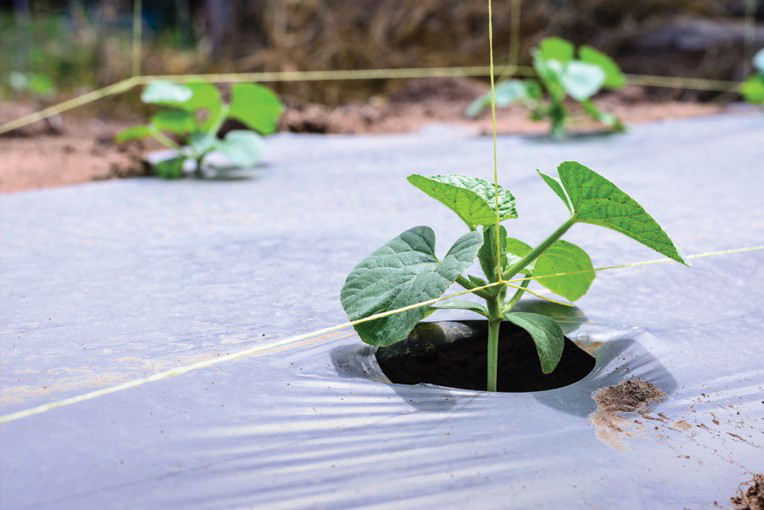
f AROUND 3,500,000 metric tons of plastic film is produced every year for the Plasticulture market.

THE WORLD NEEDS to radically increase food and fibre production to feed and clothe a global population predicted to exceed 9.5 billion people by 2050.
It will have to achieve this using essentially the same land area as is currently used for crop production, but with much less water, less nutrients and less agrochemicals.
This will require further intensification of irrigated and dryland cropping systems so that more of the water that enters the soil is transpired, rather than being used by weeds and/or ‘lost’ through soil evaporation and deep drainage.
Polymer membrane technology offers extensive benefits to farmers and the environment.
CSIRO has tackled this challenge by developing a sprayable biodegradable polymer membrane technology for use in agricultural crop production systems to minimise soil evaporation, suppress weeds and improve crop water productivity in order to increase crop yields, farm income and farm profitability.
Around 3,500,000 metric tons of plastic film is produced every year for the Plasticulture market, representing a significant opportunity for market disruption via a new technology.
The Plasticulture market enjoys an average annual growth rate of about 5 per cent, and research firm Markets and Markets projects the global agricultural films market to reach a value of US$11,744 million by 2020.
With the promise of reduced labour costs for installation and removal compared to plastic mulch film, the technology has the potential to significantly benefit growers and large-scale agribusiness by offering a recognisable value proposition for their enterprises. Further commercial opportunities also exist.
Results to date show significant gains have been made in crop water use and yield by using plastic mulch films, and that sprayable biodegradable polymer membrane technology offers extensive benefits to farmers and the environment compared to preformed plastic mulch films.
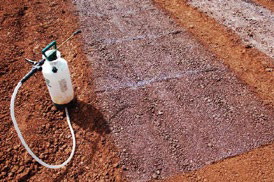
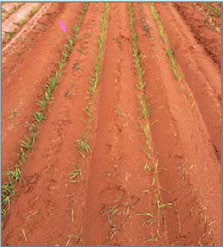
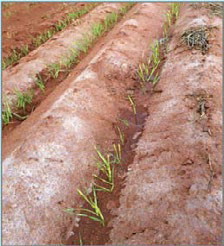
FIGURE 1. SPRAYABLE POLYMER MEMBRANE OFFERS FARMERS FLEXIBILITY, HELPS REDUCE PRODUCTION COSTS, AND ELIMINATES SOIL AND WATER POLLUTION (FIELD DEMONSTRATION OF THE NON-PIGMENTED POLYMER FORMULATION).
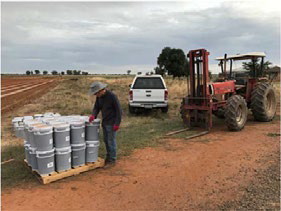
FIGURE 2. COMMERCIAL SCALE UP OF POLYMER WAS SUCCESSFUL WITH THE FIRST SET OF PALLETS DELIVERED TO THE MELON FIELD TRIAL SITE.
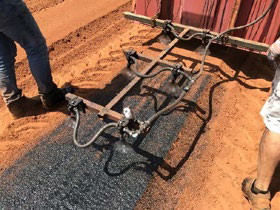
FIGURE 3. USING MULTIPLE SPRAY NOZZLES TO IMPROVE UNIFORMITY OF APPLICATION (BLACK PIGMENTED POLYMER FORMULATION THAT MAINTAINS IN-FIELD COLOURATION).
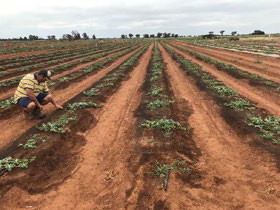
FIGURE 4. INSTALLED MELON FIELD TRIAL.
Transitioning to sprayable biodegradable polymer membrane technology will offer farmers considerable flexibility and help eliminate costs associated with installation, retrieval and disposal, as well as eliminating the environmental damage caused by the pollution of soil and water systems associated with current petroleum-based preformed plastics.
CSIRO sprayable technology has been demonstrated in laboratory pot experiments and in irrigated field plot trials using melons, sorghum and cotton.
These trials have confirmed increases in crop water productivity in excess of 30 per cent compared with bare soil treatments.
Pre-commercial farm trials are now underway and providing valuable lessons regarding:
1. biodegradability and non-toxicity of the polymer membrane and potential risks to soil health,
2. water use, weed suppression, crop yield and the cost: benefit of different product application rates, across full crop cycles under real world conditions, and
3. fine-tuning the polymer formulation, its application and impact, as demonstrated by Figures 2–4.
Trials performed by the CSIRO to date have also demonstrated the ability to apply its polymer membrane with small handheld sprayers and currently available large, mechanised sprayers.
This makes the product suitable for use by small holder farmers in developing countries and large commercial farm operations in developed countries.
MORE INFORMATION